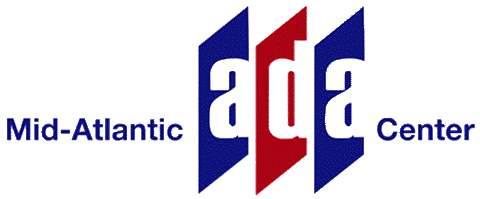(Printer-friendly PDF version | 195 KB)
(Large-print PDF | 199 KB)
(Versión en español)
The Department of Justice (DOJ) has amended its regulations implementing Title II and Title III of the Americans with Disabilities Act (ADA), which apply to public (state and local governments) and private entities (public accommodations and commercial facilities), respectively. These revised regulations took effect on March 15, 2011, with some exceptions. Fact Sheets in this series are available on each of these topics.
Summary of Changes
Effective Communication
- A covered entity must communicate effectively with individuals with disabilities who are companions of customers, clients, patients, etc., to the same extent the entity communicates with companions without disabilities.
- Video Remote Interpreting (VRI) services are now considered an auxiliary aid that may be used to facilitate effective communication.
- A covered entity must not rely on an individual accompanying a person with a disability to provide interpreting services except in limited circumstances.
- A qualified reader is an individual who is able to read effectively, accurately and impartially using any specialized vocabulary.
Examinations and Courses
- If an entity requires documentation of disability before granting an accommodation request, then the documentation requirement needs to be reasonable and limited to the need for the modification, accommodation, or auxiliary aid or service requested.
- Prior modifications received in similar situations should be granted considerable weight.
- A covered entity must respond in a timely manner to requests for modifications.
Places of Lodging
- The revised regulations impact how places of lodging manage their reservation processes, including providing information about accessible features through reservation systems, hold and release of accessible guest rooms, and working with third party reservation providers, as well as the dispersion of accessible guest rooms.
Service Animals
- A service animal is defined as a dog individually trained to perform work or tasks to benefit a person with a disability.
- Other species of animals, wild or domestic, whether trained or untrained, are not service animals.
- Covered entities may also need to make reasonable modifications in policies to allow individuals with disabilities to use miniature horses individually trained to perform disability-related tasks.
Ticketing
- Clarification is provided on issues related to ticketing for accessible seating at events in both publicly and privately owned venues. Guidance is provided on requirements related to pricing; purchasing multiple tickets; providing information about accessible seating features, locations and availability; hold and release of tickets for accessible seating; ticket transfer; the secondary ticket market; and prevention of fraud.
Wheelchairs and Other Power-Driven Mobility Devices (OPDMDs)
- Wheelchairs must be permitted in all areas open to pedestrian use.
- An “other power-driven mobility device” (OPDMD) is any mobility device powered by batteries, fuel or other engines, used by individuals with disabilities as their mobility device of choice, whether designed primarily for use by individuals with disabilities or not (such as the Segway® PT). Such devices must be permitted unless the covered entity can demonstrate that the class of device cannot be operated in accordance with legitimate safety requirements.
Detention and Correctional Facilities
- Inmates or detainees with disabilities must have equal access to services, programs and activities and be housed in the most integrated setting appropriate.
- Three percent of newly constructed or altered cells must be accessible to individuals with mobility disabilities.
Overview of the 2010 ADA Standards for Accessible Design
- Compliance with the 2010 ADA Standards is required for all new construction and alterations undertaken on or after March 15, 2012.
- “Safe harbor” means that elements, spaces, or facilities built or altered in compliance with 1991 Standards, or the Uniform Federal Accessibility Standards (UFAS) in the case of state or local government entities, do not have to be brought into compliance with 2010 Standards unless the element, space, or facility undergoes an alteration on or after March 15, 2012.
- Safe harbor provisions do not apply to existing elements which were not specifically addressed in the 1991 Standards but which are subject to new requirements in the 2010 Standards. Such spaces and elements include jails and prisons; court facilities; and recreational facilities such as golf courses, swimming pools, play areas, exercise machines and equipment, and amusement rides; among others.
Parking
- Under the safe harbor provision, parking facilities that comply with the 1991 Standards do not have to be brought into compliance with the 2010 Standards until the facility is altered. If a parking lot undergoes an alteration (re-striping, re-surfacing, etc.) it must be brought into compliance with the 2010 Standards to the maximum extent feasible.
- One of every six accessible parking spaces, or fraction thereof, must be “van-accessible.”
- Hospital and rehabilitation outpatient facilities require an increased number of accessible parking spaces in visitor and patient parking areas.
|
Content was developed by the Mid-Atlantic ADA Center, and is based on professional consensus of ADA experts and the ADA National Network. |
|
|
TransCen, Inc. |
The contents of this factsheet were developed under grants from the National Institute on Disability, Independent Living, and Rehabilitation Research (NIDILRR grant numbers 90DP0089 and 90DP0086). NIDILRR is a Center within the Administration for Community Living (ACL), Department of Health and Human Services (HHS). The contents of this factsheet do not necessarily represent the policy of NIDILRR, ACL, HHS, and you should not assume endorsement by the Federal Government. |
|
© Copyright 2013 ADA National Network. All Rights Reserved. |
|

.png)





